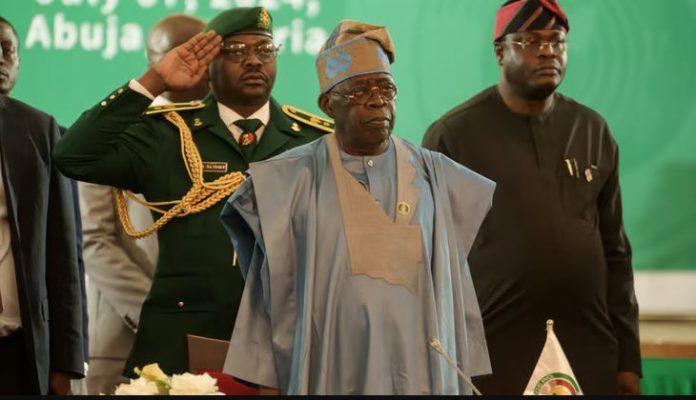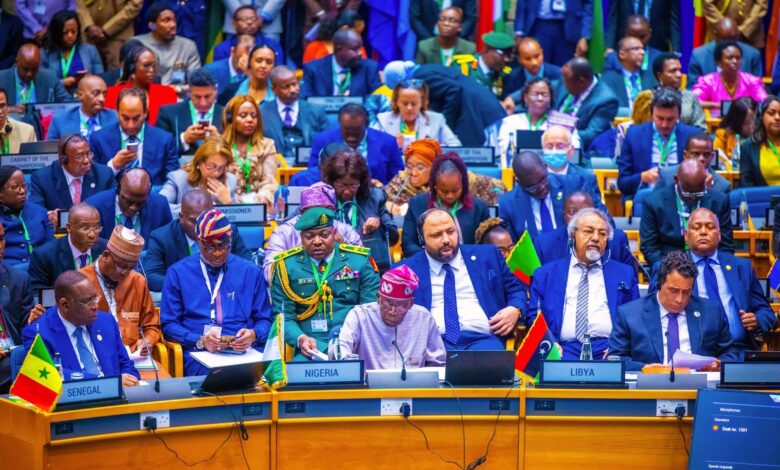Bola Ahmed Tinubu’s re-election as the Chairman of the Economic Community of West African States (ECOWAS) marks another significant omen for Nigeria and the West African region.
At present, ECOWAS is already nearing the launch of its single currency initiative, known as ECO.
Bola Ahmed Tinubu’s re-election as the Chairman of the Economic Community of West African States (ECOWAS) marks another significant omen for Nigeria and the West African region.
For Nigeria, Tinubu’s continued leadership reinforces the country’s influence within ECOWAS, enabling it to play a pivotal role in shaping regional policies and initiatives. This leadership position aligns with Nigeria’s strategic interests, allowing it to address issues such as security, economic integration, and political stability more effectively.
Tinubu’s re-election underscores his commitment to regional cooperation and stability. Under his leadership, ECOWAS has emphasised peacekeeping, conflict resolution, and economic development. His tenure has seen efforts to mediate political crises in member states and address security challenges posed by terrorism and insurgency.
With Tinubu’s continued leadership, there is potential for intensified efforts in these areas, contributing to a more secure and stable West African region.
Diplomatic factor and end to regional dispute
Ogun State governor, Dapo Abiodun, describes Tinubu’s leadership at the sub-regional level as one that reflects the unwavering trust and confidence reposed in his leadership by the region.
He lauded Tinubu for showing statesmanship in handling the violent change of government by three member states, noting that this averted what could have been a severe crisis in the region.
“His commitment to dialogue averted what could have amounted to war, which would have had dire consequences for the entire region,” he said.
Similarly, Dr Doyin Okupe, a former Director-General of the Labour Party (LP) Presidential Campaign Council, described Tinubu as an astute leader.
He, however, sympathised with him, noting that his leadership at the national and regional levels comes at a torrid time.
Dr Okupe said Tinubu’s leadership style is a plus for ECOWAS, especially in his quest to unite the Sahel Nations of Mali, Burkina Faso and Niger back to the fold.
“The Africa Union as a body can be made to officially spearhead this reconciliatory agenda while a diplomatic outreach to Russia for this purpose, especially if handled at the level of the AU, will certainly be helpful,” he said.
Economic factor/single currency initiative
Economically, Tinubu’s re-election could bolster regional integration initiatives. ECOWAS has long advocated for economic cooperation and establishing a common market to enhance trade and investment opportunities among member states.
At present, ECOWAS is already nearing the launch of its single currency initiative, known as ECO. The Nigerian government has given its support to the plan, which aims to stimulate growth and development across West Africa.
The ECO will be included in the new three-in-one identity card by the National Identity Management Commission (NIMC), scheduled for release in August.
Finance Ministers and Central Bank Governors from the 15 ECOWAS member states finalised the details of the initiative at the 92nd Ordinary Session of the ECOWAS Council of Ministers in Abuja this week.
Infrastructural development/cross-regional trade
With Tinubu at the helm, there is potential for renewed focus on infrastructure development, trade facilitation, and implementing policies that promote economic growth and poverty reduction across the region.
Neighbouring member states like Benin, Niger, and Chad would benefit from these economic policies within the region.
For West Africa, Tinubu’s leadership represents continuity and the potential for steady progress on longstanding issues. His experience and diplomatic acumen are assets in navigating the region’s complex political landscape.
As chairman, Tinubu is expected to continue fostering collaboration among member states, advocating for democratic governance, and addressing the socio-economic challenges that impact the region’s development.
His re-election signifies a commitment to these shared goals, promising sustained efforts toward a more unified and prosperous West Africa.














